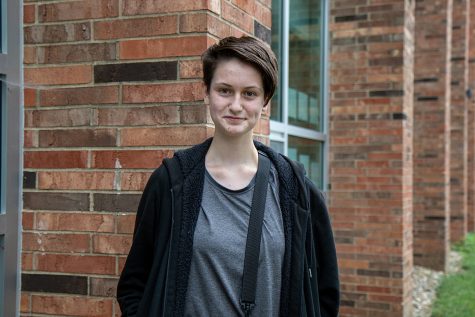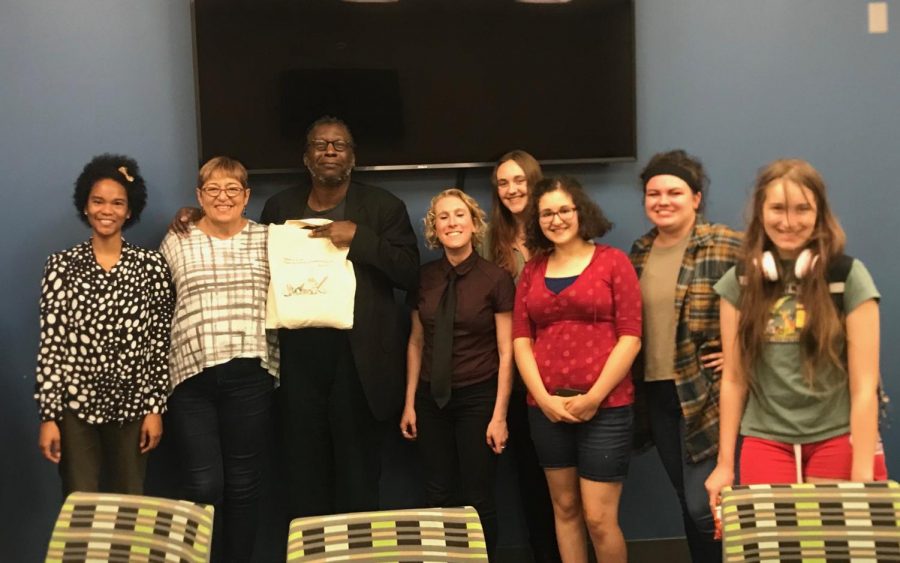Meeting Toi Derricotte and Cornelius Eady
Toi Derricotte and Cornelius Eady met with teenagers at the Iowa City Public Library to answer questions and share two prompts.
Meeting Toi Derricotte and Cornelius Eady in a small room down a hallway off a hallway in the Iowa City Public Library seemed akin to a joke at first. Two famous poets and writers open to meeting the public and answering as many questions as we could throw at them before learning two new techniques to write a pretty good poem? Sounds far too good to be true. But as I walked into the room two minutes late due to having run for a good five minutes trying to find the secluded room, there they were. Sitting, laid back, into the slightly plush rolling chairs. They looked relaxed. Nervous even. There weren’t many people there, a few people from the Iowa Youth Writing Project, the organization that set up the event, and only three other high school students.
Watching them speak was enthralling, like watching an impromptu performance. Derricotte spoke slowly, sometimes repeating a word and glancing around, as if searching for the right sentence among a page. She was purposeful, every light shake of hands seeming to demonstrate a point. She spoke with her hands, allowing them to flail a bit sometimes, wringing them, or tapping the painted nails with her thumb. But if you got her to laugh, she’d throw her head back with it, shaking slightly. If she spoke immediately after, it was breathless and quick, straying from the smooth, deliberate pace she’d set earlier. She was quiet too, though she told stories and added detail, there were only as many words as there needed to be, and she often ended up nodding along, or humming in agreement.
Eady, on the other hand, spoke hurriedly, with a slight stutter, he spoke as if the words weren’t already neatly laid out in his head, but as if they were popping into his head as he said them. He would lean forward sharply, as if intent on making the words reach us. His hands often ended up folded or clasped together, and he would rock as far back as he could when Derricotte spoke, physically giving her the stage. When he spoke, he spoke for a long time, going on and on, drifting into other subjects and forgetting the original question, though answering the silent questions no one dared to ask. His eyes rarely seemed to focus, he constantly made eye contact, intently focusing on who was speaking and then checking to see if we were listening. Occasionally, his eyes would drift to the ceiling as he repeated a word a few times, before his eyes would snap back down as the right words clicks into place. He nodded along with Derricotte when she spoke, the slight tilt of someone trying to quietly support the words.
They somehow managed to pull great topics out of simple questions, like when they were asked what age they started writing, Eady managed to end it up on how all writers end up feeling a bit like imposters.
“Most of us never get to when we actually feel free. Right? I mean, we [never feel we] actually know 100% what we’re doing and we’re not, we’re not imposters and you know, someone’s gonna call us on-finally our, you know, you always feel that.”
I think we only managed to ask them two, maybe three questions, before the half hour was up. They seemed able to talk and talk forever about this thing that they loved, writing, but not in the dull way, in the way that has you unconsciously sitting slightly forward in your seat, hanging onto every word.
There was one quote by Eady that stands out sharply.
“One of the presenters said, basically, it’s such a big difference being […] a writer and being an author, and it makes sense, right? Everyone writers, not everyone gets published, right? So you have to get to that point, with that mind, [that] you want to be a public [writer].” At this, there was a chorus of hums and other verbal agreements, before Derricotte jumped in saying, “I mean, even that you’ve come to this workshop, you know, you didn’t have to come here. So you start making these little choices.”
They were also personal, talking to us. Not as children, but as fellows. Equals. Telling stories and wandering off topic to make small talk or little jokes. There was never a feeling of divide between ‘us’ and ‘them’. They managed to bridge that gap, and after going to many talks with big-time writers, I can tell you that’s a great, and rare, skill.
They spoke on what they called ‘big P poetry’. For those who don’t know, big p poetry means poetry with a capitalized P. It’s proper, important, and the kind of thing you learn in school.
“[Big P poetry] is something that you’re force fed … but you don’t really think this has anything to do with you, right?” Eady said.
After the questions, we worked on Eady’s prompt, as was decided by a coin flip, though they both brought prompts. Eady’s was simple, based on Joe Brainard, called “I Remember”, based off of his autobiography. Just write down as many things starting with ‘I remember’ as you can in a certain time frame. We used five minutes. After that, spend three minutes writing all the ‘I remember’ statements that you didn’t put down the first time. The ones you thought of but chose not to put down. The group thought of it’s own little twist; start a poem with the words ‘I remember’ and then never say it again.
Derricotte’s was much longer and less simplistic. It’s like a formula for a poem, with nice big blanks waiting to be filled in. First,you say ‘I am from’ and then list two things you use to clean your house. Next, say two things that are supplies for some other thing you do, and so on and so forth. The end is something similar to ‘I am from’ and then name people from your childhood. Essentially, it’s meant to give you a few different starting points for a poem, or rolled into one poem.
Overall, it was a great hour, manging to straddle the line between giving advice and being personal. Though it was a bit shocking to have two impressive authors in such a small space speaking to such a small group, I ended up walking away with the feeling that these two really seemed to care. The tone was surprisingly friendly, especially when compared to one of the many other events occurring this week.
Your donation will support the student journalists of West High School. Your contribution will allow us to purchase Scholarship Yearbooks, newsroom equipment and cover our annual website hosting costs.

(all) Renee Gould is a senior at West, it is their third year on staff and is currently the opinion editor for the online publication.



